Related Research Articles

The Pope, also known as supreme pontiff, Roman pontiff or sovereign pontiff, is the bishop of Rome, head of the worldwide Catholic Church, and has also served as the head of state or sovereign of the Papal States and later the Vatican City State since the eighth century. From a Catholic viewpoint, the primacy of the bishop of Rome is largely derived from his role as the apostolic successor to Saint Peter, to whom primacy was conferred by Jesus, who gave Peter the Keys of Heaven and the powers of "binding and loosing", naming him as the "rock" upon which the Church would be built. The current pope is Francis, who was elected on 13 March 2013.
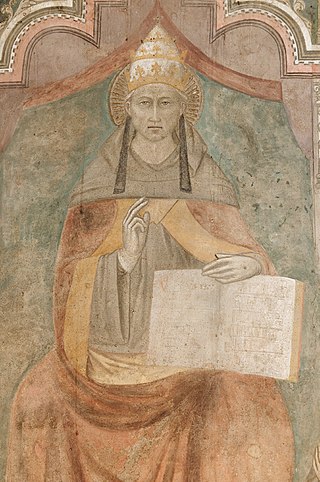
Pope Celestine V, born Pietro Angelerio, also known as Pietro da Morrone, Peter of Morrone, and Peter Celestine, was head of the Catholic Church and ruler of the Papal States for five months from 5 July to 13 December 1294, when he resigned. He was also a monk and hermit who founded the order of the Celestines as a branch of the Benedictine order.

Pope Benedict XVI was the head of the Catholic Church and sovereign of the Vatican City State from 19 April 2005 until his resignation on 28 February 2013. Benedict's election as pope occurred in the 2005 papal conclave that followed the death of Pope John Paul II. Benedict chose to be known as "Pope emeritus" upon his resignation, and he retained this title until his death in December 2022.
A papal renunciation also called a papal abdication, occurs when the reigning pope of the Catholic Church voluntarily steps down from his position. As the reign of the pope has conventionally been from election until death, papal renunciation is an uncommon event. Before the 21st century, only five popes unambiguously resigned with historical certainty, all between the 10th and 15th centuries. Additionally, there are disputed claims of four popes having resigned, dating from the 3rd to the 11th centuries; a fifth disputed case may have involved an antipope.
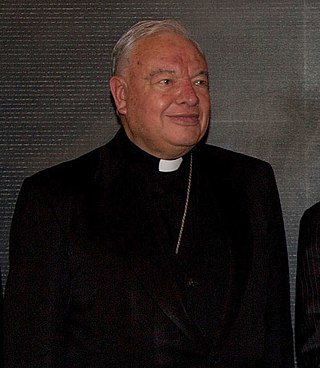
Juan Sandoval Íñiguez is a cardinal of the Roman Catholic Church, and served as Archbishop of Guadalajara.

Peter Kodwo Appiah Turkson is a Ghanaian prelate and cardinal of the Catholic Church who has served as chancellor of the Pontifical Academies of Sciences since 2022. He was president of the Pontifical Council for Justice and Peace from 2009 to 2017 and the inaugural prefect of the Dicastery for the Promotion of Integral Human Development from 2017 to 2021.
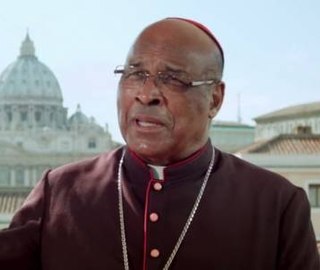
Wilfrid Fox Napier OFM is a South African prelate of the Catholic Church. He served as Archbishop of Durban from 1992 to 2021 and has been a cardinal since 2001. He served as Bishop of Kokstad from 1981 to 1992.

Agostino Vallini is an Italian prelate of the Catholic Church. He has been a cardinal since 2006. From 2008 to 2017 he served as Vicar General of Rome. He is also the Archpriest emeritus of the Archbasilica of St. John Lateran.
During his papal tenure, Pope Benedict XVI focused on building on the outreach of his predecessors towards Islam, particularly on the efforts of Pope John Paul II, who experts say established trust and opened opportunities for dialogue with Muslims. One of the important milestones in the Pope's efforts included a religious and peaceful initiative called A Common Word. This was provoked by an ill-conceived 2006 lecture he delivered at a university in Regensburg, Germany, which prompted Muslim leaders to gather and make overtures to their Christian and Jewish counterparts. Later on, Pope Benedict pursued key initiatives that helped foster Christian and Muslim dialogue. These were founded on the Pope's belief that Christians and Muslims have shared religious experience and that Christianity and Islam are both theologically founded in "God's irruptive call ... heard in the midst of man's ordinary daily existence."

Paolo Romeo is a cardinal and archbishop emeritus of Palermo. He was appointed to the see of Palermo by Pope Benedict XVI on 19 December 2006.
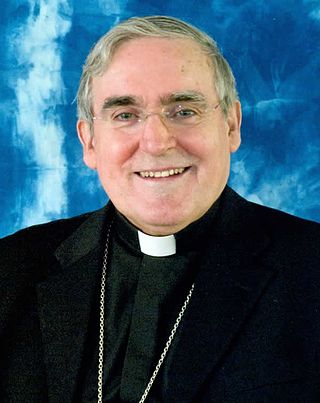
Lluís Martínez i Sistach is a Spanish prelate of the Catholic Church. He is Archbishop emeritus of Barcelona, having served as archbishop there from 2004 to 2015. He has been a cardinal since 2007.
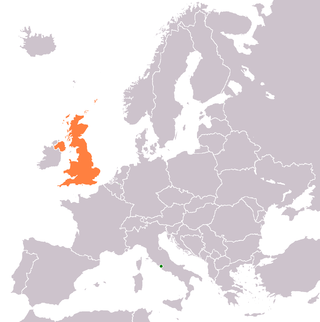
Holy See–United Kingdom relations are foreign relations between the Holy See and the United Kingdom.

Pope John Paul II reigned as pope of the Roman Catholic Church and sovereign of the Vatican City State for 26 years from October 1978 to his death, on 2 April 2005. Since his death, many thousands of people have been supporting the case for beatifying and canonising Pope John Paul II as a saint. His formal beatification ceremony took place on 1 May 2011.

The state visit of Pope Benedict XVI to the United Kingdom was held from 16 to 19 September 2010 and was the first visit by a Pope to Britain after Pope John Paul II made a pastoral, rather than state, visit in 1982. The visit included the beatification of Cardinal Newman as a "pastoral highlight".

Holy See – United Arab Emirates relations are the foreign relations between the Holy See and the United Arab Emirates (UAE). The earliest form of contact between officials of both states was when the founder of the UAE, Sheikh Zayed bin Sultan Al Nahyan, unofficially met Pope John Paul II in the 1980s. Relations between the two were not established until 31 May 2007. According to a Vatican communiqué, the diplomatic arrangement was founded on a desire to promote “bonds of mutual friendship and of strengthening international cooperation.

His Holiness: The Secret Papers of Benedict XVI is a book published by the Italian journalist Gianluigi Nuzzi of confidential letters and memos between Pope Benedict XVI and his personal secretary. The letters in the book portray the Vatican as a corrupt hotbed of jealousy, intrigue and underhanded factional fighting.
The Vatican leaks scandal, also known as Vati-Leaks, is a scandal beginning in 2012 initially involving leaked Vatican documents, exposing corruption; in addition, an internal Vatican investigation has purportedly uncovered the blackmailing of homosexual clergy by individuals outside the Church. Italian journalist Gianluigi Nuzzi published letters from Archbishop Carlo Maria Viganò in which he exposed corruption that caused the Holy See to pay increased prices for contracts.

Catholic Voices is a communications project to train ordinary Catholic men and women to speak on television and radio about controversial issues related to the Catholic Church. The project started in Britain in 2010 but has now spread to over 20 other countries.

On 31 December 2022, at 09:34 Central European Time (UTC+1), Pope Benedict XVI died at the Mater Ecclesiae Monastery in Vatican City at the age of 95. He had been pope emeritus since his resignation as the leader of the Catholic Church in 2013 due to ill health. His death ended a nine-year period during which an incumbent pope and a retired pope both lived within Vatican City.
References
- 1 2 "Leaked FCO memo 'will not affect Pope visit'". BBC News Online. 26 April 2010. Retrieved 3 August 2010.
- ↑ Gordon Rayner; Nick Pisa (26 April 2010). "Offensive condom memo threatens Pope's UK visit". Irish Independent . Retrieved 3 August 2010.
- 1 2 "Foreign Office apologises for Pope 'condom' memo". BBC News Online. 25 April 2010. Retrieved 3 August 2010.
- ↑ Rayner, Gordon (27 April 2010). "Diplomat disciplined over Pope memo is named". The Daily Telegraph . London. Retrieved 3 August 2010.
- ↑ Sugden, Joanna (26 April 2010). "Oxford graduate Steven Mulvain, 23, sent 'puerile' Pope visit memo". The Times . Retrieved 3 August 2010.
- 1 2 Holden, Michael (24 April 2010). "Britain apologises over papal "condoms" document". Reuters . Retrieved 3 August 2010.
- ↑ Mackinnon, Lachlan (27 April 2010). "Civil servant who sent 'vile' email about the Pope's visit to UK is named and shamed.. but keeps his job". The Daily Record . Retrieved 3 August 2010.
- ↑ Hamblin, Andrea (30 July 2020). "Diplomat who sent Pope 'condom' memo given final warning and banned from overseas postings". The Telegraph.